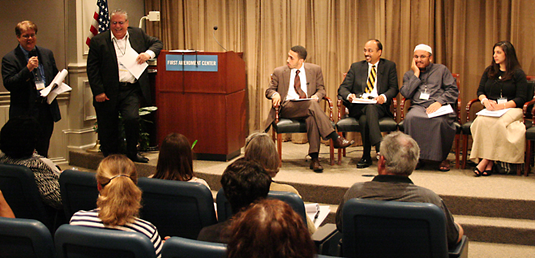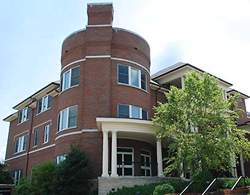ABOUT THE CONFERENCE
Islam is becoming an increasingly volatile news topic in America. Acts of terrorism by Muslim fundamentalists combined with the U.S.’s increasing military involvement in the Muslim world has increased awareness at the same time that it has bred misconceptions about the religion and the range of cultures that follow it. Many reporters have found themselves covering controversies on the local or state level that suddenly demand an understanding of Islam, Sharia and Muslim culture, as protests against planned mosques, proposals of anti-Sharia legislation, and accusations against local Muslim communities of harboring terrorism are increasingly in the news.
Surveys reveal a pervasive mistrust of Muslims among a significant proportion of Americans: An MTSU Poll of Tennesseans revealed that, while three-quarters agreed that Muslims should have the same religious rights as other Americans, 39 percent nevertheless thought that local communities should be able to prohibit the building of mosques, and 32 percent thought that Muslims in the U.S. should have to register their whereabouts. There are also several national organizations that advocate strident anti-Muslim views, asserting that Muslims collectively intend to impose Sharia law on the U.S. and that Islam is more a political movement than a religion, a view expressed even by some prominent politicians.
In this atmosphere of conflicting views, accusations and mistrust, it’s all the more important for reporters to have a sufficient background and understanding of the topic. This conference provided an opportunity for the participating journalists to learn more about Islam, to share their own experiences in covering the topic and to improve their writing and reporting.

In one of the conference sessions, participants had the opportunity to ask questions of several representatives of Nashville-area Muslim communities. This session was moderated by Joe Grimm of the Michigan State University School of Journalism, left, and Osama Siblani, Publisher of The Arab American News.
The conference included nine sessions held over two and a half days, led by thirteen speakers and panelists. Participation was limited to 22 attendees — professional journalists and religion writers who were chosen through an application process.
The plan was to first talk about the difficulty reporters face in trying to be unbiased, and then about the quality of reporting that is currently taking place—Butch Ward and Larry Pintak addressed these issues. Then a knowledgeable professor of history and religion, Dr. Messier, provided an overview of the history of Islam and what Shariah and Jihad really mean.
Asma Uddin, an international law attorney and Muslim, talked about legal issues such as proposed, and in some places enacted, legislation against aspects of Islam and opposition to mosques, and Bob Smietana, religion reporter for the Tennessean, talked about his investigations into the network of anti-Muslim groups and speakers.

The First Amendment Center, Nashville.
The last day was devoted to workshops and discussion groups, the first of which was an opportunity for the participants to ask questions of a group of six guests from local Muslim communities. This was followed by a roundtable discussion with several veteran news editors, and a workshop led by Gregory Favre which included some brainstorming on how reporters can better engage with their local communities.